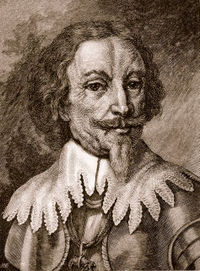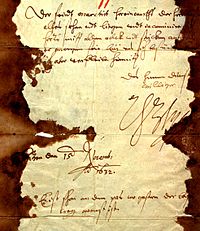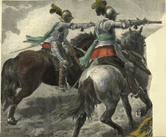- Gottfried Heinrich Graf zu Pappenheim
-
Gottfried Heinrich Graf zu Pappenheim 
Gottfried Heinrich Graf zu PappenheimBorn May 29, 1594
Pappenheim on the Altmühl, BavariaDied November 17, 1632 (aged 38)
Leipzig, SaxonyAllegiance  Holy Roman Empire
Holy Roman EmpireYears of service - November 16, 1632 Battles/wars Thirty Years' War  The Bauernhügel monument in Pinsdorf, Upper Austria, commemorates the peasant insurgents suppressed by Papenheim. It appears on the village's coat of arms
The Bauernhügel monument in Pinsdorf, Upper Austria, commemorates the peasant insurgents suppressed by Papenheim. It appears on the village's coat of arms
Gottfried Heinrich Graf zu Pappenheim (May 29, 1594 – November 17, 1632) was field marshal of the Holy Roman Emperor in the Thirty Years' War.
Contents
Biography
Pappenheim was born at the little town of Pappenheim on the Altmühl, in Bavaria, the seat of a free lordship of the empire, from which the ancient family to which he belonged derived its name.
He was educated at Altdorf and at Tübingen, and subsequently travelled in southern and central Europe, mastering the various languages, and seeking knightly adventures. His stay in these countries led him eventually to adopt the Roman Catholic faith (1614), to which he devoted the rest of his life. At the outbreak of the great war he abandoned the legal and diplomatic career on which he had embarked, and in his zeal for the faith took service in Poland and afterwards under the Catholic League.
He soon became a lieutenant-colonel, and displayed brilliant courage at the battle of the White Mountain near Prague (November 8, 1620), where he was left for dead on the field. In the following year he fought against Mansfeld in western Germany, and in 1622 became colonel of a regiment of cuirassiers. In 1623, as an ardent friend of Spain, the ally of his sovereign and the champion of his faith, he raised troops for the Italian war and served with the Spaniards in Lombardy and the Grisons. It was his long and heroic defence of the post of Riva on the Lake of Garda which first brought him conspicuously to the front.
In 1626 Maximilian I of Bavaria, the head of the League, recalled him to Germany and entrusted him with the suppression of a dangerous peasant rebellion which had broken out in Upper Austria. Pappenheim swiftly carried out his task, encountering a most desperate resistance, but always successful; and in a few weeks he had crushed the rebellion with ruthless severity (actions of Efferdingen, Gmünden, Vöcklabruck and Wolfsegg, 15–30 November 1626).
After this he served with Tilly against Christian IV of Denmark, and besieged and took Wolfenbüttel. His hope of obtaining the sovereignty and possessions of the evicted prince of Brunswick-Wolfenbüttel was, after a long intrigue, definitely disappointed.
In 1628 he was made a count of the empire. The siege and storm of Magdeburg followed, and Pappenheim, like Tilly, has been accused of the most savage cruelty in this transaction. But it is known that, disappointed of Wolfenbüttel, Pappenheim desired the profitable sovereignty of Magdeburg, and it can hardly be maintained that he deliberately destroyed a prospective source of wealth.
From the military point of view Pappenheim's conduct was excellent; his measures were skillful, and his personal valour, as always, conspicuous. So much could not be said of his tactics at the battle of Breitenfeld, the loss of which was not a little due to the impetuous cavalry general, who was never so happy as when leading a great charge of horse. The retreat of the imperialists from the lost field he covered, however, with care and skill, and subsequently he won great glory by his operations on the lower Rhine and the Weser in rear of the victorious army of Gustavus Adolphus. Much-needed reinforcements for the king of Sweden were constantly detained by Pappenheim's small and newly-raised force in the north-west.
His operations were far-ranging and his restless activity dominated the country from Stade to Kassel, and from Hildesheim to Maastricht. Being now a field marshal in the imperial service, he was recalled to join Wallenstein, and assisted the generalissimo in Saxony against the Swedes; but, was again despatched towards Cologne and the lower Rhine. In his absence a great battle became imminent, and Pappenheim was hurriedly recalled. He appeared with his horsemen in the midst of the battle of Lützen (November 16, 1632). His furious attack was for the moment successful. As Rupert at Marston Moor sought Cromwell as his worthiest opponent, so now Pappenheim sought Gustavus. At about the same time as the king was killed, Pappenheim received a mortal wound in another part of the field. He died later the same day or early the next morning en route to Leipzig, where his body was embalmed at the Pleissenburg fortress.
Legacy
His name forms the key part of the Czech, Flemish, Dutch, Scandinavian, and German colloquialism; "I know my fellow Pappenheims" ("ich kenne meine Pappenheimer"). It is used to imply tongue-in-cheek that someone has, is or will be acting in a way that is completely expected. The sentence originally held a positive connotation and referred to the determination of Pappenheim's horsemen. Friedrich Schiller used the modified sentence "Daran erkenn' ich meine Pappenheimer" in his "Wallenstein" trilogy.
The form of rapier called the pappenheimer, is named after him according to "Webster's Encyclopedic Unabridged Dictionary of the English Language: Deluxe Edition."
Notes
Regarding personal names: Graf is a title, translated as Count, not a first or middle name. The female form is Gräfin.
References
- Kriegsschriften von baierischen Officieren I. II. V. (Munich, 1820);
- Hess, Gottfried Heinrich Graf zu Pappenheim (Leipzig, 1855);
- Ersch and Grüber, Allgem. Encyklopädie, III. II (Leipzig, 1838);
- Wittich, in Allgem. deutsche Biographie, Band 25 (Leipzig, 1887), and works there quoted.
 This article incorporates text from a publication now in the public domain: Chisholm, Hugh, ed (1911). Encyclopædia Britannica (11th ed.). Cambridge University Press.
This article incorporates text from a publication now in the public domain: Chisholm, Hugh, ed (1911). Encyclopædia Britannica (11th ed.). Cambridge University Press.
Categories:- 1594 births
- 1632 deaths
- German nobility
- German Roman Catholics
- Austrian Field Marshals
- German expatriates in Austria
- German people of the Thirty Years' War
- University of Altdorf alumni
- University of Ingolstadt alumni
- University of Tübingen alumni
Wikimedia Foundation. 2010.



